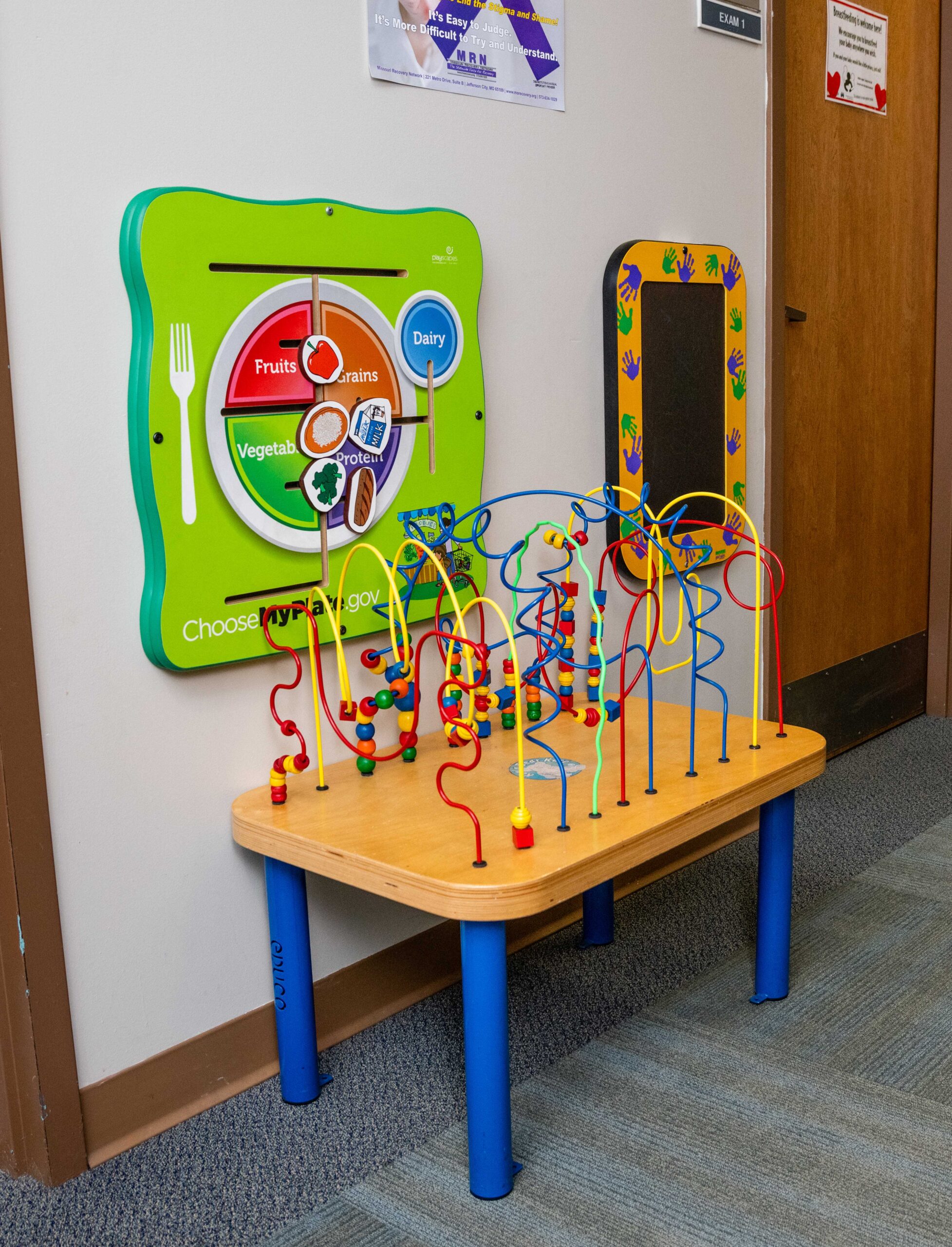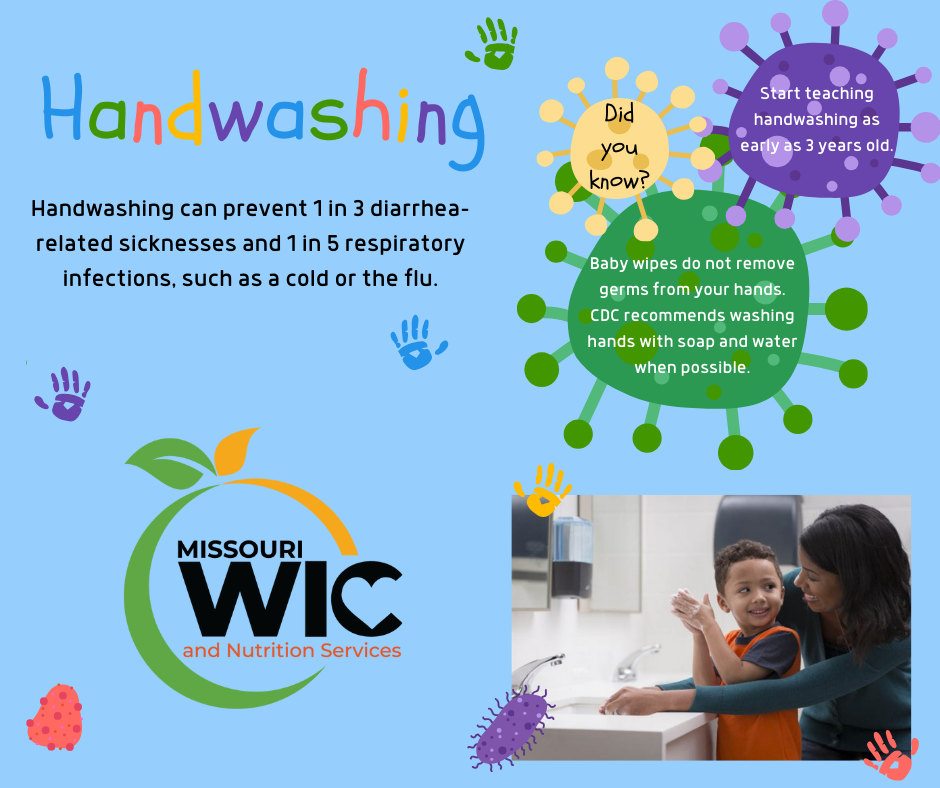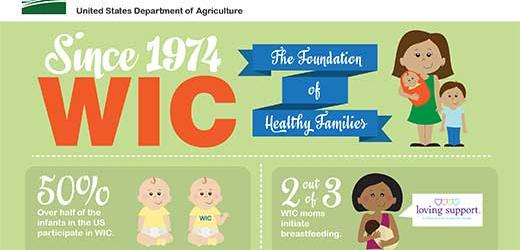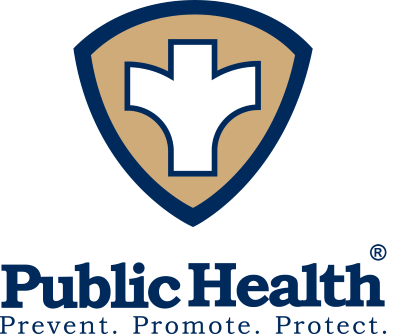
WIC
Women, Infants, and Children (WIC) Program in Webster County
The Women, Infants, and Children (WIC) Nutrition program at the Webster County Health Unit is a supplemental food program for women who are pregnant, breastfeeding, or up to six months postpartum, and for children up to five years old. Participants must qualify for the program based on income and nutritional risk.
Each month, the Webster County WIC program provides services to more than 900 women, infants, and children. To access these services, participants must make an appointment by calling (417)859-2532.
This vital grant from the Missouri Department of Health and Senior Services (DHSS) has been renewed for the current calendar year.

WIC Information
Find more information abut the WIC program, eligibility, food package, and guidelines below.
Food Package

WIC Food Package
The Women, Infants, and Children (WIC) food packages provide supplemental foods designed to meet the special nutritional needs of pregnant, breastfeeding, and non-breastfeeding postpartum people as well as infants and children up to five years old.
Food Package Benefits
The WIC foods:
- Encourage more whole grains and fiber
- Increase fruit and vegetable intake
- Provide nutrients during pregnancy, infancy, and early childhood
- Support cultural food preferences
Possible Included Items
The WIC food package may include:
- Brown rice
- Canned / dried beans
- Fresh or frozen fruits and vegetables
- Whole grain cereals and breads
- Whole wheat and soft corn tortillas
- Yogurt
- Tofu
- Soy milk
- Cultured buttermilk
- Canned fish
- Milk
- Eggs
- Cheese
Eligibility
WIC Eligibility
Applicants must meet all of the following eligibility requirements:
- Categorical
- Residential
- Income
- Nutrition Risk
Categorical Requirement
The WIC Program is designed to serve certain categories of women, infants, and children. Therefore, the following individuals are considered categorically eligible for WIC
Women
- Pregnant (during pregnancy and up to 6 weeks after the birth of an infant or the end of the pregnancy
- Postpartum (up to six months after the birth of the infant or the end of the pregnancy)
- Breastfeeding (up to the infant’s first birthday)
Infants
- (up to the infant’s first birthday)
Children
- (up to the child’s fifth birthday)
Residential Requirement
Applicants must live in the State in which they apply. Applicants served in areas where WIC is administered by an Indian Tribal Organization (ITO) must meet residency requirements established by the ITO. At State agency option, applicants may be required to live in a local service area and apply at a WIC clinic that serves that area. Applicants are not required to live in the State or local service area for a certain amount of time in order to meet the WIC residency requirement.
Income Requirement
To be eligible for WIC, applicants must have income at or below an income level or standard set by the State agency or be determined automatically income-eligible based on participation in certain programs.
Income Standard. The State agency’s income standard must be between 100 percent of the Federal poverty guidelines (issued each year by the Department of Health and Human Services), but cannot be more than 185 percent of the Federal poverty income guidelines.
Automatic Income Eligibility. Certain applicants can be determined income-eligible for WIC based on their participation in certain programs. These included individuals:
- Eligible to receive SNAP benefits
- Medicaid, for Temporary Assistance for Needy Families (TANF, formerly known as AFDC
- Aid to Families with Dependent Children), in which certain family members are eligible to receive Medicaid or TANF
- State agency option, individuals that are eligible to participate in certain other State-administered programs.
Nutrition Risk Requirement
Applicants must be seen by a health professional such as a physician, nurse, or nutritionist who must determine whether the individual is at nutrition risk. In many cases, this is done in the WIC clinic at no cost to the applicant. However, this information can be obtained from another health professional such as the applicant’s physician.
“Nutrition risk” means that an individual has medical-based or dietary-based conditions. Examples of medical-based conditions include anemia (low blood levels), underweight, or history of poor pregnancy outcome. A dietary-based condition includes, for example, a poor diet.
At a minimum, the applicant’s height and weight must be measured and bloodwork taken to check for anemia. An applicant must have at least one of the medical or dietary conditions on the State’s list of WIC nutrition risk criteria.
The WIC Prescreening Tool
This web-based application intends to help potential WIC applicants determine if they are likely to be eligible for WIC benefits. Users who are likely to be eligible to receive WIC benefits are provided with State-specific contact information and are encouraged to make a certification appointment with their WIC local agencies. Additionally, users are provided with a printable summary of their responses and a list of examples of the documentation that is required at an initial certification appointment.

Breastfeeding Assistance
Research has shown that there is no better food than breast milk for a baby’s first year of life. Breastfeeding provides many health, nutritional, economical and emotional benefits to mother and baby. Since a major goal of the WIC Program is to improve the nutritional status of infants, WIC mothers are encouraged to breastfeed their infants. WIC has historically promoted breastfeeding to all pregnant women as the optimal infant feeding choice, unless medically contraindicated.
Meet with Lactation Consultant
The Webster County Health Unit has an International Board Certified Lactation Consultant (IBCLC) on staff to assist with breastfeeding education, questions and concerns. During regular business hours, call 417-859-2532. After hours call the Health Unit’s Breastfeeding Support Hotline at 417-241-5326.
Receive a Free Manual Pump
Manual pumps are available to WIC clients at no cost. For more information speak to your WIC nutritionist or the Breastfeeding Peer Counselor.
Car Seat & Infant Safe Sleep Programs:
Learn more here!
Nondiscrimination
In accordance with federal civil rights law and U.S. Department of Agriculture (USDA) civil rights regulations and policies, this institution is prohibited from discriminating on the basis of race, color, national origin, sex (including gender identity and sexual orientation), disability, age, or reprisal or retaliation for prior civil rights activity.
Program information may be made available in languages other than English. Persons with disabilities who require alternative means of communication to obtain program information (e.g., Braille, large print, audiotape, American Sign Language), should contact the responsible state or local agency that administers the program or USDA’s TARGET Center at (202) 720-2600 (voice and TTY) or contact USDA through the Federal Relay Service at (800) 877-8339.
To file a program discrimination complaint, a Complainant should complete a Form AD-3027, USDA Program Discrimination Complaint Form which can be obtained online at: https://www.usda.gov/sites/default/files/documents/USDA-OASCR%20P-Complaint-Form-0508-0002-508-11-28-17Fax2Mail.pdf, from any USDA office, by calling (866) 632-9992, or by writing a letter addressed to USDA. The letter must contain the complainant’s name, address, telephone number, and a written description of the alleged discriminatory action in sufficient detail to inform the Assistant Secretary for Civil Rights (ASCR) about the nature and date of an alleged civil rights violation. The completed AD-3027 form or letter must be submitted to USDA by:
Mail:
U.S. Department of Agriculture Office of the Assistant Secretary for Civil Rights 1400 Independence Avenue, SW Washington, D.C. 20250-9410; or
Fax:
(833) 256-1665 or (202) 690-7442; or
[email protected]
This institution is an equal opportunity provider.

